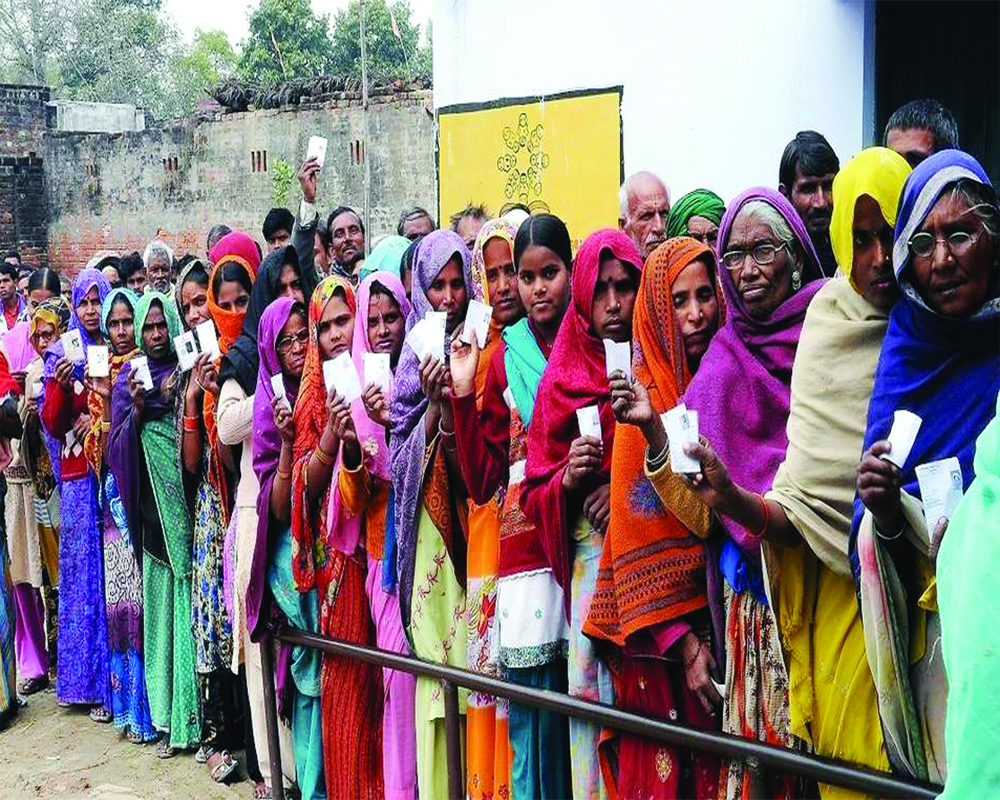The Indian voter needs to take responsibility for all his constitutional duties, which include carefully electing representatives to legislatures
The nation is in election mode. People in the five States are aware that these elections are being keenly watched; and possible outcomes being conjectured not only in India but also abroad. Every party, each candidate enters the fray claiming to adhere faithfully to the basic values enshrined in our Constitution. Candidates with tainted records also formally swear by the Constitution at the time of filing papers. At election times, the need for electoral reforms — particularly debarring candidates facing serious criminal cases — is cursorily mentioned. Not much happens, though, as the lawmakers are not interested for obvious reasons. The overall credibility of elected representatives is nowhere near what was expected when the Constitution was finalised.
It would be worthwhile to recall what Dr Rajendra Prasad, the Constituent Assembly president, mentioned in his speech on November 26, 1949: “Whatever the Constitution may or may not provide, the welfare of the country will depend on the way it is administered. That will depend upon the men who administer it. It is a trite saying that a country can have only the Government it deserves. If those elected are capable, and men of character and integrity, they will be able to make the best even of a defective Constitution. If they are lacking, the Constitution cannot help the country. After all, a Constitution like a machine is a lifeless thing. It acquires life because of the men who control it and operate it, and India needs today nothing more than a set of honest men who will have the interest of the country before them.”
These apprehensions come straight from the heart of the person who had sacrificed his entire life for the country, and was speaking to all those with a similar background. Those stalwarts were concerned about the nation’s future, and that included the quality, character and integrity of the elected representatives. They would constitute the Government and Opposition in legislatures. Their integrity, honesty and dedication to service of people must be beyond any shadow of doubt. After over seven decades, one finds there could be no better articulation of the anxiety and anguish that every concerned Indian citizen experiences at this juncture of history; in fact their measure has enhanced after every election.
In his historic Gettysburg address on November 19, 1863, US President Abraham Lincoln gave a definition of democracy that is invariably quoted in every discussion on Governments, systems of governance and their relationship to the aspirations of people: “…this nation, under God, shall have a new birth of freedom — and that Government of people, by people, for people, shall not perish from the earth.” This, obviously, describes an ideal democracy which, in actual practice, slowly transforms in various allotropes, depending upon the system people accept and the way they elect representatives. Further, the extent to which these representatives comprehend democracy in letter and spirit makes a difference. Power corrupts and, in democracy, falling prey to the bounties of power is very likely.
In Indian democracy, people talk about ‘disproportionate assets’ of their representatives throughout the country, at every level. It is in public knowledge and has led to serious erosion of (exceptions apart) the credibility of representatives. The bond of mutuality now stands tattered. There are umpteen instances of elected Lok Sabha or State legislature members not being seen in their constituency for years together. Corruption in high places is discussed but, in final analysis, generally goes unpunished. Was all this unexpected? Probably not. Eminent constitutional expert and jurist Dr Subhash Kashyap presents a brilliant indepth analysis of democracy, governance and Parliament. In his treatise ‘State of the Nation’ (2018), he refers to one of the greatest jurists, Joseph Storey, who said that “howsoever immaculately built by founding fathers to last for eternity, a Republic may perish in an hour by the folly, or corruption, or negligence of its only keepers, the people”. In his own words: “Republics are created by the virtue, public spirit and intelligence of citizens. They fall when the wise are banished from public councils because they dare to be honest, and the profligate are rewarded because they flatter people, to betray them.”
Celebrating 75 years of freedom, every Indian citizen stands witness to absence of virtue on every count in elections and that includes the manner people change their loyalties unashamedly, when unsure of a ticket for themselves or family members, and the astonishing temerity with which they claim to do it in public interest! One wonders how the Constitution’s founding fathers would have reacted to every party welcoming each and every ‘Aaya Ram Gaya Ram’ without hesitation. They get tickets, may even win and become Ministers. In the Indian Republic, as per constitutional guarantee, people are supreme; all are equal and entitled to every public office. Could they ignore their role in such cases? Could any alert, active and responsive democracy, and people constituting it, permit the continuation of criminals and party-hoppers in politics?
The maturity of the Indian voter is by now well-established. He has to realise that in Loktantra, sovereign power rests with him. How to use it as a duty is to be decided by people, nobody else.
(The author works in education, social cohesion and religious amity. The views expressed are personal.)


























